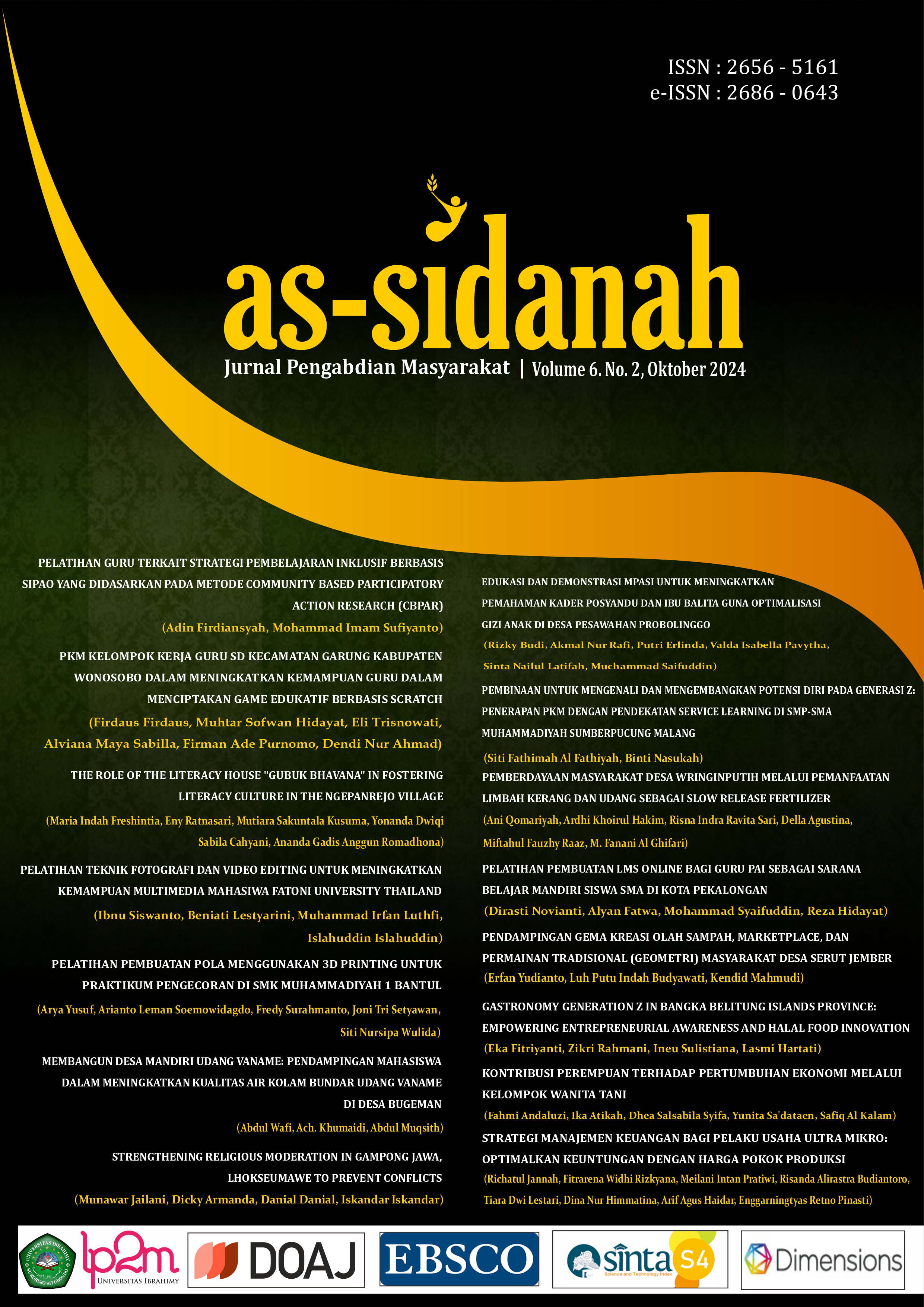PKM KELOMPOK KERJA GURU SD KECAMATAN GARUNG KABUPATEN WONOSOBO DALAM MENINGKATKAN KEMAMPUAN GURU DALAM MENCIPTAKAN GAME EDUKATIF BERBASIS SCRATCH
DOI:
https://doi.org/10.35316/assidanah.v6i2.250-266Kata Kunci:
Community Service, Computational Thinking, Scratch Programming, Teacher Work GroupAbstrak
The 21st century requires everyone to adapt to digital culture. Computational thinking skills help deal with digital culture. These skills can be provided to students through teaching and learning. However, there are several obstacles to achieving this goal. First, teachers do not yet understand how to teach students computing skills through classroom learning. Second, there needs to be more teaching skills based on computational thinking. This community service aims to improve teachers' abilities in training students' computational thinking skills. This is done in the context of teaching and learning to provide 21st-century skills through Scratch programming. The approach used in this activity is educational and participatory. Namely, the implementation of the service contains educational elements and is oriented towards efforts to improve the role of teachers. Community service is carried out through three stages: material preparation, program implementation, evaluation, and monitoring. The material preparation stage involves collecting material from various literature. The program implementation stage provides material regarding 21st-century learning and learning design using Scratch programming. Teachers are also engaged in using Scratch and how to involve students with this programming. The monitoring and evaluation stage includes process evaluation at the end of each activity and product evaluation. This community service shows that 91% of all teachers experienced increased skills in making various learning creations such as animations, games, and simulations based on Scratch programming. Additionally, 87% of all teachers who participated in the activity experienced increased skills in integrating scratch-based teaching materials into learning. This service activity aims to increase teacher skills in teaching computational thinking through scratch programming, which is expected to improve the quality of education in the digital era significantly.
Unduhan
Referensi
Binkley, Marilyn, Ola Erstad, Joan Herman, Martin Ripley, Mike Rumble, and May Miller-Ricci. “Assessment and Teaching of 21st Century Skills (ATC21S).” In Griffin, P., McGaw, B., Care, E. (Eds) Assessment and Teaching of 21st Century Skills. Springer, 2012.
Black, Beth. “An Overview of a Programme of Research to Support the Assessment of Critical Thinking.” Thinking Skills and Creativity 7, no. 2 (2012): 122–133. http://dx.doi.org/10.1016/j.tsc.2012.04.003.
Ennis, R. H. “Critical Thinking: A Streamlined Conception.” Teaching of Psychology 14, no. 1 (1991): 5–23.
Hidayat, Muhtar Sofwan, and Eli Trisnowati. “Mengembangkan Kemampuan Berpikir Komputasi Dan Efikasi Diri Calon Guru Sekolah Dasar: Pendekatan Pembelajaran Berbasis Proyek Dengan Pemrograman Scratch.” Jurnal Riset Pendidikan Indonesia 1, no. 1 (2021): 29–37.
Ibrohim, Maulana Malik, Eveline Siregar, and Uwes Anis Chaeruman. “Scratch and Computational Thinking in Elementary School: A Meta-Analysis.” AL-ISHLAH: Jurnal Pendidikan 15, no. 3 (2023): 2703–2715.
Kim, Sharon, Mahjabeen Raza, and Edward Seidman. “Improving 21st-Century Teaching Skills: The Key to Effective 21st-Century Learners.” Research in Comparative and International Education 14, no. 1 (2019): 99–117.
Kwangmuang, Parama, Suwisa Jarutkamolpong, Watcharee Sangboonraung, and Srisuda Daungtod. “The Development of Learning Innovation to Enhance Higher Order Thinking Skills for Students in Thailand Junior High Schools.” Heliyon 7, no. 6 (2021): e07309. https://doi.org/10.1016/j.heliyon.2021.e07309.
Mardhiyah, Rifa Hanifa, Sekar Nurul Fajriyah Aldriani, Febyana Chitta, and Muhamad Rizal Zulfikar. “Pentingnya Keterampilan Belajar Di Abad 21 Sebagai Tuntutan Dalam Pengembangan Sumber Daya Manusia.” Lectura: Jurnal Pendidikan 12, no. 1 (2021): 29–40.
Masigno, Richard M. “Enhancing Higher Order Thinking Skills in a Marine Biology Class through Problem-Based Learning.” Asia Pacific Journal of Multidisciplinary Research 2, no. 5 (2014): 1–6.
Pendidikan, Badan Standar Nasional. “Paradigma Pendidikan Nasional Abad XXI.” Paradigma Pendidikan Nasional Abad XXI, 2010.
Polya, G. How to Solve It. Princeton: Princeton University Press, 1985.
Redhana, I Wayan. “Mengembangkan Keterampilan Abad Ke-21 Dalam Pembelajaran Kimia.” Jurnal Inovasi Pendidikan Kimia 13, no. 1 (2019).
Shin, Namsoo, Jonathan Bowers, Joseph Krajcik, and Daniel Damelin. “Promoting Computational Thinking through Project-Based Learning.” Disciplinary and Interdisciplinary Science Education Research 3, no. 1 (2021).
Suhardi, Muhamad. Buku Ajar Manajemen Pendidikan Dan Pelatihan. Lombok: Pusat Pengembangan Pendidikan dan Penelitian Indonesia, 2023.
Wilson, Kate. “Critical Reading, Critical Thinking: Delicate Scaffolding in English for Academic Purposes (EAP).” Thinking Skills and Creativity 22 (2016): 256–265.
Unduhan
Diterbitkan
Cara Mengutip
Terbitan
Bagian
Lisensi






















